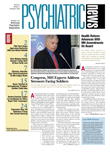Starting cholinesterase inhibitors, a class of medications commonly prescribed for Alzheimer's disease, is associated with a doubled risk for hospitalization due to bradycardia in older patients, but many clinicians appear not to recognize this safety concern, according to a large population study by Canadian researchers.
Cholinesterase inhibitors, including donepezil, rivastigmine, and galantamine, are prescribed for patients with Alzheimer's disease to slow symptom deterioration, but they do not halt or reverse the disease progression. In addition to increasing the availability of acetylcholine in the brain, these drugs have been associated with systemic cholinergic side effects such as upset stomach, diarrhea, hypersalivation, and muscle cramps. This retrospective, case-control study is the first large analysis of the serious cardiac side effect associated with this drug class.
The researchers, led by Laura Park-Wyllie, Pharm.D., at St. Michael's Hospital in Ontario, Canada, scanned the medical and prescription drug data from 1.4 million residents of Ontario province aged at least 67 years between January 2003 and March 2008. They used a mixture of different controls to analyze the likelihood of recent exposure, defined as starting a cholinesterase inhibitor within the past three months, in patients who were hospitalized for bradycardia. First, patients served as their own controls, and their rate of exposure to a cholinesterase inhibitor within three months before hospitalization (risk interval) was compared with their rate of exposure within six to nine months before the hospitalization (reference interval). In addition, these patients were compared with control subjects who were matched in age, sex, clinical characteristics, and exposure to cholinesterase inhibitors, but were not hospitalized for bradycardia.
More than 27,000 older patients who were hospitalized for bradycardia and had any exposure to cholinesterase inhibitor at some point were identified. Only 161 of these patients met the inclusion criteria to allow for the case-control analyses, as they had cholinesterase inhibitor exposure in either the risk or reference interval, but not both. Three-fourths of these patients were prescribed donepezil.
The authors found a statistically significant association between hospitalization due to bradycardia and initiating a cholinesterase inhibitor within the immediately preceding three months. The odds ratio of hospitalization was calculated to be 2.13, with the 95 percent confidence interval between 1.29 and 3.51, for recent cholinesterase inhibitor exposure after controlling for various potential confounding factors.
Since the study focused on the temporal association between drug exposure and hospitalization and did not investigate cases of bradycardia not serious enough for hospitalization or that had resulted in death, it could not assess the absolute risk of bradycardia associated with the drugs, the authors acknowledged.
Seventeen of the 161 hospitalized patients received a pacemaker, and six died before discharge. Of the other 138 patients who were discharged without a pacemaker, 78 (57 percent) were restarted on cholinesterase inhibitors within three months, “presumably because the potential causative role of these drugs in the hospitalization was not appreciated [by their physicians],” the authors wrote. Because these drugs have marginal effectiveness on cognition and functioning in many patients with dementia, the authors pointed out, the risk-benefit balance must be weighed carefully.
The study was published in the September open-source journal PLoS Medicine. The authors received grant support from the Canadian Institutes for Health Research and Ontario Ministry of Health and Long-Term Care.
